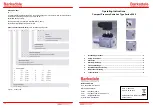
DTP CrossPoint 84 • Installation
11
Local and Mic/Line audio connectors
Use the supplied tie-wrap to strap the audio cable to the extended tail of the connector.
Unbalanced Stereo Output
Balanced Stereo Output
Unbalanced Stereo Input
Balanced Stereo Input
Do not tin the wires!
Tip
No Ground Here
No Ground Here
Tip
LR
Sleeves
Tip
Ring
Tip
Ring
LR
Sleeves
Tip
Ring
Tip
Ring
LR
Sleeves
Tip
Sleeve
Sleeve
Tip
LR
Tip (+)
Jumper
Gnd (Sleeve, )
Tip (+)
Ring (–)
Gnd (Sleeve, )
Unbalanced Mono (Mic) Input
Balanced Mono (Mic) Input
Figure 8.
Audio Input and Output Connector Wiring
ATTENTION:
•
For unbalanced audio output, connect the sleeves to the ground
contac
t.
DO NOT
connect the sleeves to the negative (-) contacts.
•
Pour l’audio asymétrique, connectez les manchons au contact au sol. Ne
PAS
connecter les manchons aux contacts négatifs (–).
NOTES:
•
The length of exposed wires is important. The ideal length is 3/16 inch (5 mm).
•
If the stripped section of wire is longer than 3/16 inch, the exposed wires may
touch, causing a short circuit.
•
If the stripped section of wire is shorter than 3/16 inch, wires can be easily pulled
out even if tightly fastened.
•
Do not tin the power supply leads. Tinned wires are not as secure in the
connector and could be pulled out.
RS-232 and IR connectors
Figure 9 shows how to wire the RS-232 and IR connector.
Tx/Rx
Pins
Rx Tx
Tx Rx
Gnd
Gnd
RS-232 Device
IR Device
RS-232 I
R
Tx
Rx
Tx
Rx
G
OVER DTP
Tx
Gnd
RS-232 Device
Rx
Tx
Rx
G
REMOTE
Figure 9.
RS-232 and IR Connector Wiring
NOTE:
The
length of exposed wires is important (see the audio connectors
on
page 13 for more information).
8
9
















































